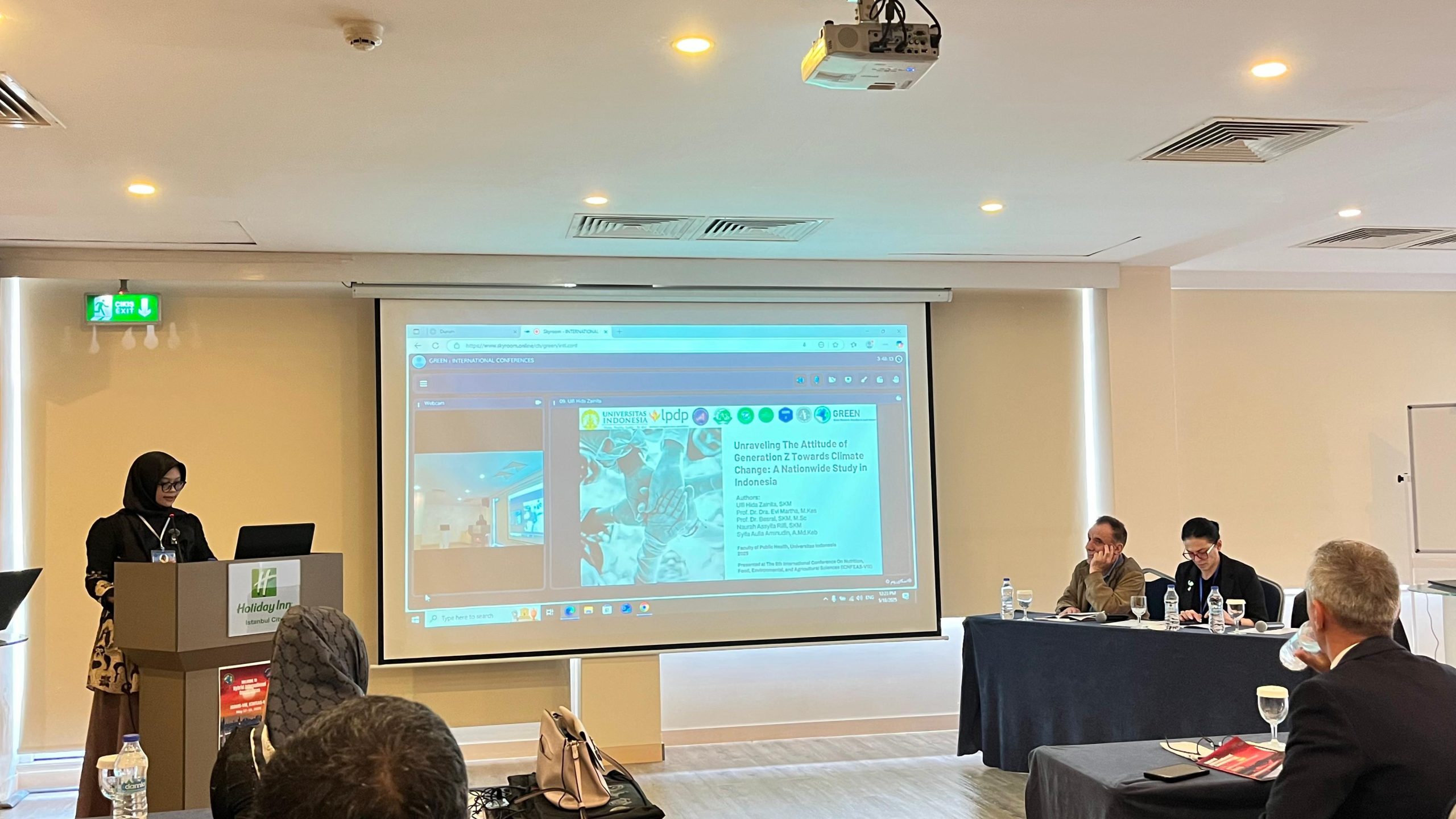The Faculty of Public Health (FPH) Universitas Indonesia (UI) continues to affirm its strategic role on the global stage as an institution that promotes impactful and innovative research. One of its recent milestones was marked at the prestigious 8th International Conference on Nutrition, Food, Environmental, and Agricultural Sciences (ICNFEAS-25), held in a hybrid format at the Holiday Inn Istanbul City Hotel, Istanbul, Turkey, on May 17–18, 2025. The conference was organized by GREEN (Global Research, Education, & Event Network) in collaboration with scientific institutions from Turkey and Hungary. It was attended by researchers and academics from various countries, including Turkey, Afghanistan, India, Albania, the US, the UK, Vietnam, Iraq, Macedonia, and Bangladesh.
Ulfi Hida, a Master of Public Health student at FPH UI, represented her team in person in Istanbul to present a paper titled “Unraveling the Attitude of Generation Z Towards Climate Change: A Nationwide Study in Indonesia.” This paper was the result of a collaborative research project led by Prof. Dr. Dra. Evi Martha, M.Kes., with academic supervision by Prof. Dr. Besral, S.K.M., M.Sc., and contributions from FPH UI alumni Naurah Assyifa Rilfi and Syifa Aulia Aminuddin. After a rigorous process of paper submission, selection, and obtaining a Letter of Acceptance (LoA), Ulfi was awarded 1st Place Best Paper Award in the Special Topics on Environmental Science category.
Focusing on climate change from the perspective of Generation Z, the study explored the views of those born between 1997 and 2012—now comprising over a quarter of Indonesia’s population. “Gen Z’s attitude towards climate issues is critical in shaping future environmental policy. That’s why we aimed to examine the depth of their awareness and concern,” Ulfi explained. The nationwide study covered five major cities across five main Indonesian islands, involving 1,126 respondents aged 13–19.
The findings showed that positive attitudes toward climate change were more prominent among respondents living in more developed regions. Socio-demographic factors such as age, gender, type of school, parental education, and information sources played significant roles in shaping their views. These results emphasize the need for environmental education that addresses emotional engagement, leverages digital platforms as effective climate communication channels, and involves families as key actors in everyday climate discussions.
Ulfi’s participation in the conference was made possible through financial support from the Indonesia Endowment Fund for Education (LPDP RI), under its international seminar grant program for awardees. “Funding was the biggest challenge, and I’m truly grateful to LPDP RI for supporting me in bringing our research to this global scientific forum,” she said. During the conference, Ulfi actively built academic networks with participants from Afghanistan, Albania, India, the UK, Vietnam, and more. She found informal settings like coffee breaks and lunch sessions to be valuable moments for exchanging ideas and discussing climate challenges across countries.
Reflecting on her experience, Ulfi expressed gratitude to all those who supported her journey—from her research team and academic advisor Dien Anshari, S.Sos., M.Si., Ph.D., to FPH UI. She also shared a message for fellow students interested in research: “Try every opportunity available. Reach out to lecturers, join research projects, find mentors who are willing to guide you. Never stop learning and give your best to everything you start,” she said. Ulfi also encouraged students to read scientific journals regularly, improve their academic writing skills, and participate in research training programs as preparation for global engagement.
Ulfi’s achievement is not only a personal success but also a testament to the capability of Indonesian students—especially from FPH UI—to excel in international forums. Amid the growing complexity of climate change, the voices and research of young generations are essential for driving more sustainable policy transformations. Her participation in ICNFEAS-25 also contributed to strengthening global dialogue and Indonesia’s position in voicing environmental concerns through the lens of youth.

